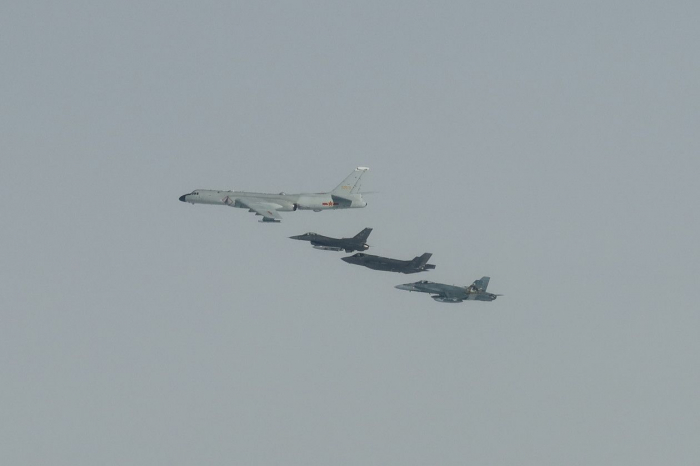Defense Secretary Lloyd Austin confirmed Thursday that the Russian and Chinese bombers that came within 200 miles of the Alaskan coast this week marked the first time the two countries have jointly flown so close to U.S. territory.
The unprecedented exercise forced the U.S. and Canada to scramble F-35, F-16 and F-18 fighter planes to shadow the bombers.
The intercept — which was announced by NORAD Wednesday evening — marked “the first time that we’ve seen these two countries fly together like that,” Austin told reporters at the Pentagon. “I think the closest point of approach was about 200 miles off of our coast.”
The flight set off alarm bells in Washington and Ottawa that Beijing and Moscow had found a new way to work together so close to North America.
Austin said that the bombers had been tracked during most of their flight and “this was not a surprise to us.”
While it’s not uncommon for Russian jets to skirt U.S. airspace around Alaska, the joint flight shows an increasingly assertive China and its expanding military relationship with Russia. The flight came just hours before President Joe Biden was slated to deliver a speech from the Oval Office explaining why he was dropping out of the presidential race.
Moscow and Beijing have forged deeper military relations in recent years, particularly since Russia’s full-scale invasion of Ukraine in 2022. Last August, the two sent 11 warships close to the Aleutian Islands, leading to the deployment of four American guided missile destroyers to shadow and track the ships, which stayed in international waters.
On Thursday, Chinese Defense Ministry spokesperson Zhang Xiaogang told reporters in Beijing that the flight marked the eighth “joint air strategic patrol” carried out by the two nations since 2019, and the exercise was “not directed at any third party, complies with international law and practices, and is unrelated to the current international and regional situation.”
While Beijing insists that it is not supplying Russia with weapons, it has stepped up the export of “dual-use” technologies like microchips and machining tools that have both civilian and military uses, while China has increased the amount of Russian oil it imports.
During the NATO summit in Washington this month, a communique signed by every member of the 32 member alliance accused Beijing of acting as “a decisive enabler of Russia’s war against Ukraine,” and demanded that it halt shipments of “weapons components” and other technology that can be used in weapons manufacturing.
“This is a relationship that we have been concerned about mostly because we’re concerned about China providing support to Russia’s illegal and unnecessary war Ukraine,” Austin said. “We’ve seen evidence of that, and we would hope that that would cease going forward, but we’ll see what happens and how this relationship continues to develop.”
Austin spoke a day before he kicks off his 11th trip to the Indo-Pacific, where he’ll travel to Japan with Secretary of State Antony Blinken on Friday for meetings with their Japanese counterparts.
Austin will also take part in a first-ever trilateral meeting of the U.S., Japanese and South Korean defense chiefs while in Tokyo.
Blinken and Austin will then head to the Philippines to meet their counterparts there. The Philippine leg of the trip likely will cause a stir in Beijing, which has been clashing with the Philippine navy on the Second Thomas Shoal in the South China Sea.
The Philippines have long kept a small contingent of marines aboard a marooned World War II-era ship on the shoal, claiming it is Philippine territory. But the Chinese coast guard has taken increasingly violent action in recent months to stop the resupply of those troops, using water cannons and ramming Philippine resupply ships.
The U.S. and Philippines have drawn markedly closer over the past year-plus, with new agreements for rotational basing for U.S. troops in the country and a spate of naval drills underscoring the reinvigorated relationship after years of tension.
“We are in an entirely new chapter of our alliance,” Austin said.
Politico
More about:















































